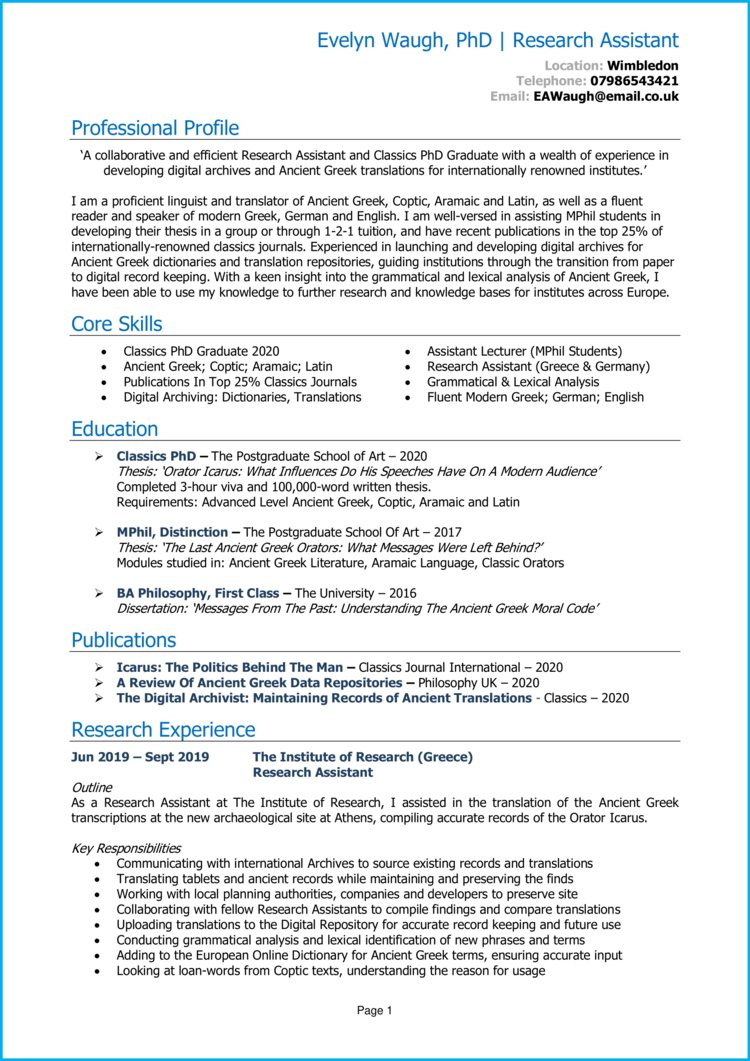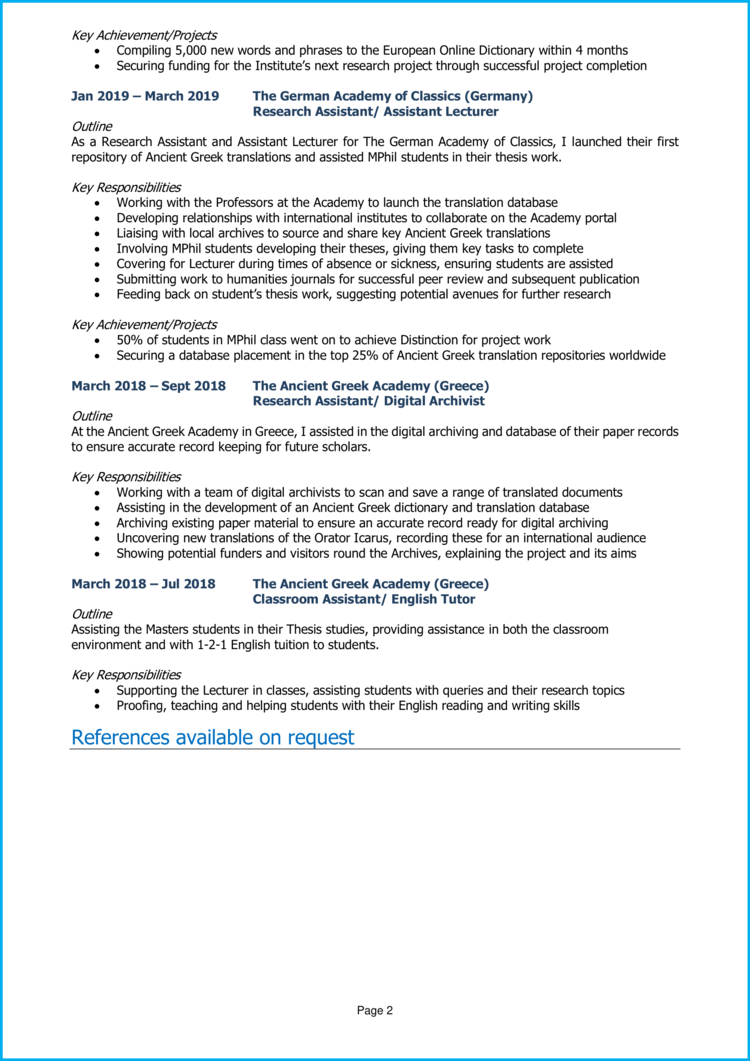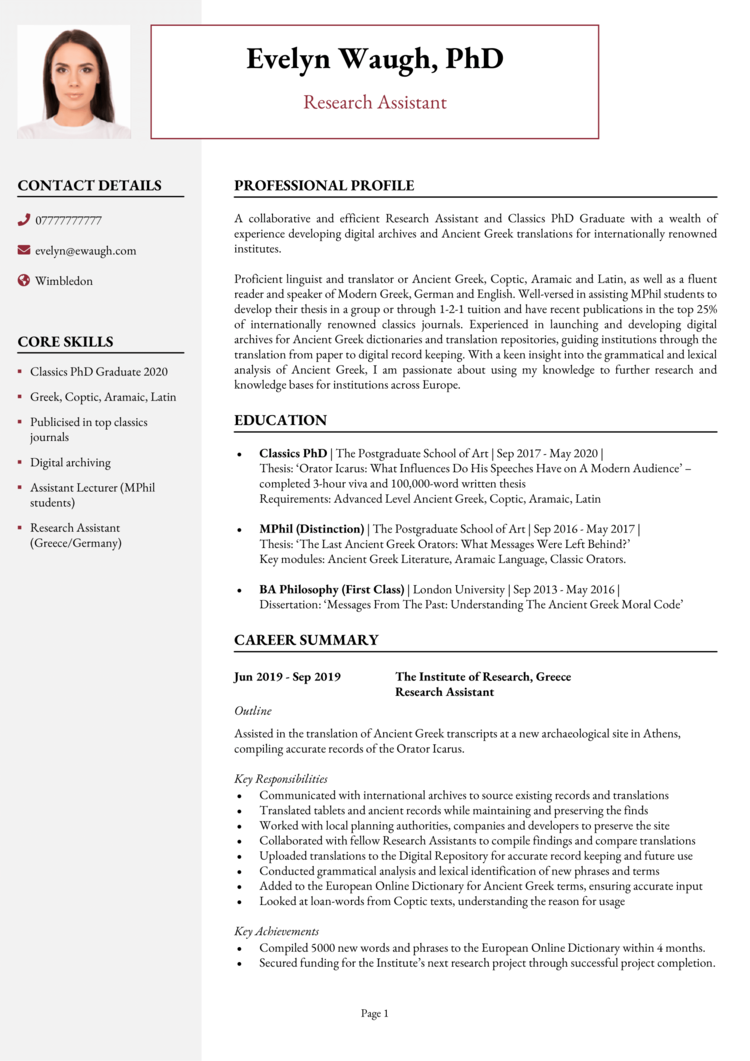- PhD Graduate CV examples

Build your CV on this template

With a PhD behind you, you’re in prime position to secure a great job and begin your career from an advanced starting point.
But PhD graduate roles are competitive in nature, so you need to stand out in the application process.
Your CV needs showcase the plethora of skills you’ve gained alongside your academic achievements and soft skills.
Our PhD graduate CV examples and writing guide will help you to do this, and get hired.
Guide contents
- Structuring and formatting your CV
- Writing your CV profile
- Detailing work experience
- Your education
- Skills required for your PhD Graduate CV

PhD Graduate CV example 1

CV templates

PhD Graduate CV example 2

Build your CV now
Before you start writing your own CV, take a look at the example PhD Graduate CV above to give yourself a basic understanding of the style and format that recruiters and hiring managers prefer to see.
Also, take note of the type of content that is included to impress recruiters, and how the most relevant information is made prominent.
PhD Graduate CV structure and format
If you focus on the written content of your CV but ignore how it actually looks, your efforts could end up wasted.
No matter how suitable you are for the role, no recruiter wants to spend time squinting and trying to navigate a badly designed and disorganised CV.
Instead, make sure to organise your content into a simple structure and spend some time formatting it for ease of reading – it’ll get you in recruiter’s good books from the get-go!

Formatting Tips
- Length: Think that submitting a five page CV will impress recruiters? You’re wrong! Even if you’ve got tons of experience to brag about, recruiters don’t have time to read through overly detailed CVs. Keep it short, concise and relevant – a CV length of 2 sides of A4 pages or less is perfect.
- Readability : Columns, lists, bullet points, bold text and subtle colour can all help to aid the readability of your CV. Your overarching goal should be to make the content as easy to read and navigate as possible, whilst also aiming to make your key skills and achievements stand out.
- Design: Your CV needs to look professional, sleek and easy to read. A subtle colour palette, clear font and simple design are generally best for this, as fancy designs are often harder to navigate.
- Avoid photos: Logos, profile photos or other images aren’t necessary and rarely add any value – save the space for written content, instead!
Structuring your CV
When writing your own CV , break up your CV content into the following key sections:
- Name and contact details – Place them at the top of your CV, so that employers can easily get in touch.
- CV profile – A punchy sales pitch of your key experience, skills and achievements to reel readers in.
- Core skills section – A bullet-pointed snapshot of your abilities.
- Work experience – A well-structured list of your relevant work experience.
- Education – An overview of any relevant qualifications or professional training you have.
- Hobbies and interests – A short description of any relevant hobbies or interests (optional).
Now I’ll guide you through exactly what you should include in each CV section.
CV Contact Details

Tuck your contact details into the corner of your CV, so that they don’t take up too much space. Stick to the basic details, such as:
- Mobile number
- Email address – It should sound professional, such as your full name.
- Location -Just write your rough location, rather than your full address.
- LinkedIn profile or portfolio URL – If you include these, ensure they’re sleek, professional and up-to-date.
PhD Graduate CV Profile
Grab the reader’s attention by kick-starting your CV with a powerful profile (or personal statement , if you’re a junior applicant).
This is a short introduction paragraph which summarises your skills, knowledge and experience.
It should paint you as the perfect match for the job description and entice recruiters to read through the rest of your CV.

Tips for creating an impactful CV profile:
- Keep it brief: Recruiters are busy, so to ensure your profile is actually read, it’s best to keep it short and snappy. 3-5 punchy lines makes for the perfect profile.
- Tailor it: If recruiters don’t see your suitability within a few seconds, they may close your CV straight away. Your CV profile should closely match the essential requirements listed in the job ad, so make sure to review them before you write it.
- Don’t add an objective: If you want to discuss your career objectives, save them for your cover letter , rather than wasting valuable CV profile space.
- Avoid cliches: Clichés like “ blue-sky thinker with a go-getter attitude” might sound impressive to you, but they don’t actually tell the recruiter much about you. Concentrate on highlighting hard facts and skills, as recruiters are more likely to take these on board.
What to include in your PhD Graduate CV profile?
- Summary of experience: Demonstrate your suitability for your target jobs by giving a high level summary of your previous work experience, including the industries you have worked in, types of employer, and the type of roles you have previous experience of.
- Relevant skills: Highlight your skills which are most relevant to PhD Graduate jobs, to ensure that recruiters see your most in-demand skills as soon as they open your CV.
- Essential qualifications: If you have any qualifications which are highly relevant to PhD Graduate jobs, then highlight them in your profile so that employers do not miss them.
Quick tip: Your CV is your first impression on recruiters, so it’s vital to avoid spelling and grammar mistakes if you want to appear professional. Use our quick-and-easy CV Builder to add pre-written content that has been crafted by recruitment experts.

Core skills section
Next, you should create a bullet pointed list of your core skills , formatted into 2-3 columns.
Here, you should focus on including the most important skills or knowledge listed in the job advertisement.
This will instantly prove that you’re an ideal candidate, even if a recruiter only has time to briefly scan your CV.

Work experience/Career history
Next up is your work experience section, which is normally the longest part of your CV.
Start with your current (or most recent) job and work your way backwards through your experience.
Can’t fit all your roles? Allow more space for your recent career history and shorten down descriptions for your older roles.

Structuring your roles
Whilst writing your CV, it’s essential to look at it from the eyes of a recruiter.
If they’re met with giant blocks of text which are impossible to navigate, they might get frustrated and skip onto the next CV.
Instead, make use of the 3-step structure shown below, to give them a pleasant reading experience.

Start with a 1-2 sentence summary of your role as a whole, detailing what the goal of your position was, who you reported to or managed, and the type of organisation you worked for.
Key responsibilities
Next up, you should write a short list of your day-to-day duties within the job.
Recruiters are most interested in your sector-specific skills and knowledge, so highlight these wherever possible.
Key achievements
Lastly, add impact by highlight 1-3 key achievements that you made within the role.
Struggling to think of an achievement? If it had a positive impact on your company, it counts.
For example, you might increased company profits, improved processes, or something simpler, such as going above and beyond to solve a customer’s problem.
At the bottom of your CV is your full education section. You can list your formal academic qualifications, such as:
- GCSE’s
As well as any specific PhD Graduate qualifications that are essential to the jobs you are applying for. Note down the name of the qualification, the organisation at which you studied, and the date of completion.
Interests and hobbies
The hobbies and interests CV section isn’t mandatory, so don’t worry if you’re out of room by this point.
However, if you have an interesting hobby , or an interest that could make you seem more suitable for the role, then certainly think about adding.
Be careful what you include though… Only consider hobbies that exhibit skills that are required for roles as a PhD Graduate, or transferable workplace skills. There is never any need to tell employers that you like to watch TV and eat out.
Essential skills for your PhD Graduate CV
Tailoring your CV to the roles you are applying for is key to success, so make sure to read through the job descriptions and tailor your skills accordingly.
However, commonly desired PhD Graduate skills include:
- Analysis – Showcase your skill with analysis of data, using mathematical and modelling concepts.
- Leadership – Your CV needs to specify how you have developed interpersonal and leadership skills, and the potential you have for the future.
- Project management – Employers are looking for evidence of your successful and organised project management skills.
- Research – Your CV is an opportunity to display your tenacity for research and the ability to apply research in practical ways.
- Self-management – Demonstrate your work ethic, ability to problem solve and take initiative, and how you also allow room for collaboration and team work.
Writing your PhD Graduate CV
Creating a strong PhD Graduate CV requires a blend of punchy content, considered structure and format, and heavy tailoring.
By creating a punchy profile and core skills list, you’ll be able to hook recruiter’s attention and ensure your CV gets read.
Remember that research and relevance is the key to a good CV, so research your target roles before you start writing and pack your CV with relevant skills.
Best of luck with your next application!
More Graduate CV examples
- Business Management Graduate CV
- Criminology Graduate CV
- Economics Graduate CV
- Fashion Graduate CV
- Finance graduate CV
- Fresh Graduate without experience CV
- Geography Graduate CV
- Graduate accounting CV
- History Graduate CV
- HR Graduate CV
- International Business Graduate CV
- Journalism Graduate CV
- MBA Graduate CV
- Media Graduate CV
- Politics Graduate CV
- Public Health Graduate CV
- Sociology Graduate CV
- Supply Chain Graduate CV
- Undergraduate Students
- Masters Students
- PhD/Doctoral Students
- Postdoctoral Scholars
- Faculty & Staff
- Families & Supporters
- Prospective Students
- Explore Your Interests / Self-Assessment
- Build Your Network / LinkedIn
- Search for a Job / Internship
- Create a Resume / Cover Letter
- Prepare for an Interview
- Negotiate an Offer
- Prepare for Graduate School
- Professionalism
- Search for a Job or Internship
- Prepare for the Academic Job Market
- Advertising, Marketing, and Public Relations
- Arts & Entertainment
- Consulting & Financial Services
- Engineering & Technology
- Government, Law & Policy
- Hospitality
- Management & Human Resources
- Non-Profit, Social Justice & Education
- Retail & Consumer Services
- BIPOC Students & Scholars
- Current & Former Foster Youth
- Disabled Students & Scholars
- First-Generation Students & Scholars
- Formerly Incarcerated Students & Scholars
- International Students & Scholars
- LGBTQ+ Students & Scholars
- Student Athletes
- Students & Scholars with Dependents
- Transfer Students
- Undocumented Students & Scholars
- Women-Identifying Students & Scholars
Curriculum Vitae (CV) Template for Doctoral Students Academic Job Search
- Share This: Share Curriculum Vitae (CV) Template for Doctoral Students Academic Job Search on Facebook Share Curriculum Vitae (CV) Template for Doctoral Students Academic Job Search on LinkedIn Share Curriculum Vitae (CV) Template for Doctoral Students Academic Job Search on X
